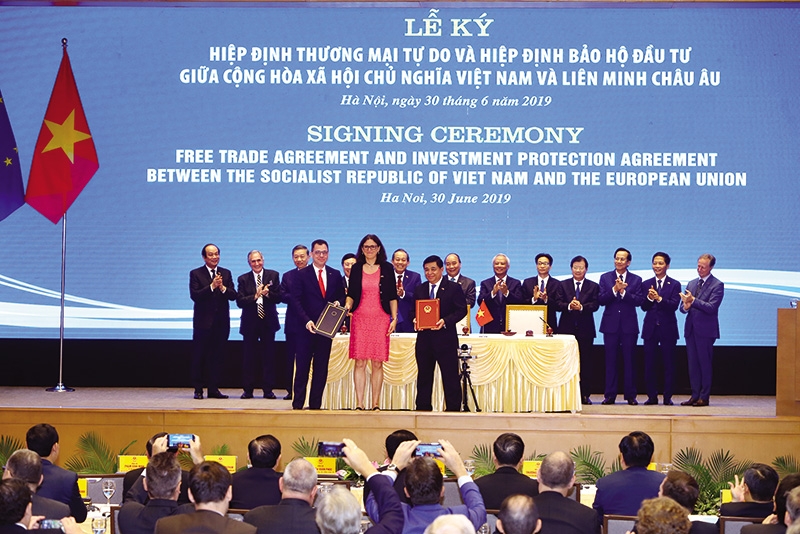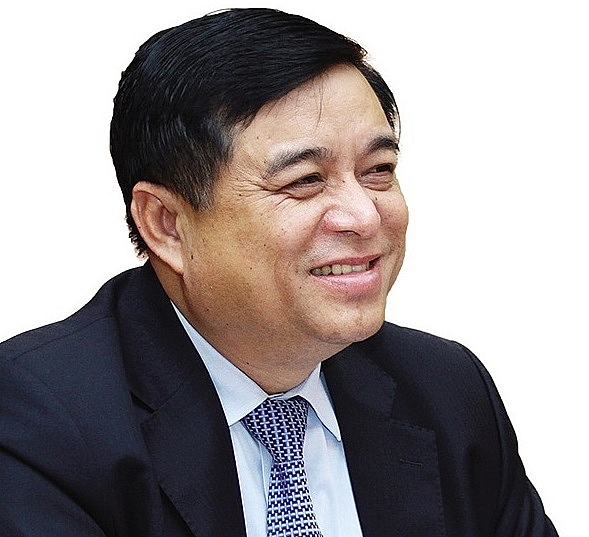Deals awaken quality European investment
 |
| Minister of Planning and Investment Nguyen Chi Dung (front, right) and EU Commissioner for Trade Cecilia Malmström (front, centre) and Romanian Minister for Business, Trade and Entrepreneurship Ștefan-Radu Oprea (front, left) signed the Investment Protection Agreement on June 30 |
The EU-Vietnam Free Trade Agreement (EVFTA) and the EU-Vietnam Investment Protection Agreement (EVIPA) have been inked. How important are the two agreements to Vietnam’s economy and foreign direct investment (FDI) attraction?
 |
| Nguyen Chi Dung, Minister of Planning and Investment |
The signing of the EVFTA and the EVIPA mark a new development step in the Vietnam-EU comprehensive partnership, and a new phase in Vietnam’s international economic integration, highlighting our dynamic economy and willingness to make reforms. The two agreements are also significant in strengthening economic connectivity between the ASEAN and the EU, as well as shoring up global economic development.
The EVFTA and EVIPA are also a key driver of economic restructuring in Vietnam, along with the improvement of institutions and the business environment, intellectual property, (IP) government procurement, labour, sustainable development, and the development of the economy in line with market principles and international best practices – especially those from the EU.
Evidently, the EVFTA has comprehensive commitments and more balanced investment protection, as well as other important content on the opening of markets to goods, services, and investment, as well as providing access to government procurement and ensuring IP. It is expected to contribute significantly to enhancing trust among foreign investors and the EU in the more attractive, safe, friendly, and competitive local business climate.
Vietnam has so far signed 21 bilateral agreements on investment protection and encouragement with EU member nations. How are the EVIPA commitments different from these treaties?
While the EVIPA includes many commitments which are also mentioned in other bilateral agreements Vietnam signed with EU members, the new agreement is more detailed and balanced than the others. Especially, the EVIPA has clearer criteria for the measures that the state is not allowed to use, while adding some exceptions based on considerations like protecting national interest and security. These include commitments of equal treatment and adequate protection for each other’s investments and investors, no expropriation of assets of investors without compensation, and compensation for possible damages from wars and riots, and allowing the free flow of capital and profit from overseas investment activities, among others.
The EVIPA also sets up a permanent court, referred to as the “Tribunal”, to handle investment disputes and replace the arbitration dispute settlement mechanism for cases outlined in the investment protection and encouragement agreements that Vietnam earlier signed with EU members. Accordingly, investment disputes are settled at the permanent court via two levels of trials: the hearing tribunal and the appeal tribunal with jury members appointed from both the EU and Vietnam. The EU side said that the commitments will help Vietnam increase EU investors’ confidence, thus encouraging them to investment more in the country.
EU investment in Vietnam remains modest. How do you expect the historical agreements will change the picture of EU investment?
Vietnam always attaches great importance to EU investors’ role, potential, and capacity in capital, technology, and management professionalism. However, EU investment in Vietnam has remained lower than expected. In the country’s next-generation foreign direct investment (FDI) attraction strategy, Vietnam will focus on EU investment with powerful finance, high technology, and advanced management.
The implementation of the EVFTA and EVIPA commitments will drive forward economic restructuring in Vietnam, along with the improvement of institutions and the business environment, thus facilitating the operation of EU investors. We believe the EVIPA will draw more high-quality EU investment inflows into Vietnam, prompted by the greater liberalisation of investment flows from the EU, particularly in the fields of specialised services such as finance, telecommunications, transport, and distribution. With the agreements, EU companies access not only the Vietnamese market with nearly 100 million people, but also the ASEAN and the other 10 nations in the Comprehensive and Progressive Trans-Pacific Partnership, to which Vietnam is a member. Besides, the stricter rules of origins in the EVFTA, as well as Vietnam’s efforts to improve the business climate, will also give the country a big push to lure more FDI from other nations to cash in on the advantages of accessing the EU market.
Not only helping to increase Vietnam’s attraction, the EVIPA will also increase the quality of FDI and attract more EU investment in industries where the bloc is particularly strong, like processing, hi-tech manufacturing, as well as clean and renewable energy which are aligned with Vietnam’s new FDI attraction strategy in the future.
The EVFTA is expected to be adopted by the European Parliament (EP) later this year or in early 2020. Meanwhile, it will take at least two years for the deal to be ratified by the EP and member states. What preparations should Vietnam make to benefit from the two deals?
The signing of the EVFTA and the EVIPA is just a starting point. A huge amount of work remains, including the ratification of the agreements from both the EU and Vietnam. The sooner the agreements are ratified, the sooner businesses and citizens of the two sides can benefit. This period is necessary and important for Vietnam to prepare for the enforcement of the EVFTA and EVIPA.
The facts prove that the EVFTA and the EVIPA bring about both opportunities and challenges for Vietnam during enforcement. The challenges come from the country’s institutional setup, policies, infrastructure system, technology skills, quality of human resources, and the capacity and competitiveness of Vietnamese businesses. To grasp the opportunities and benefits from the agreements, it is a must to issue measures and solutions to develop high-quality workforce and infrastructure, improve the competitiveness of the national economy and Vietnamese businesses, and complete business and investment institutions and policies.
Currently, the Vietnamese government is making strong efforts to do these by working on the revision, amendment, and issuance of some important laws, including the draft law on the revision of the Law on Investment 2014 and the Law on Enterprises 2014, the Law on Public-Private Partnership, the Law on Land, the Law on Construction, the Law on Environment Protection, the Labour Code, and some laws on tax, and then submit them to the National Assembly for approval. The completion of these laws is aimed to further simplify procedures and create more favourable conditions for market access and business and investment activities among citizens and businesses, including foreign-invested enterprises, while encouraging private firms to join infrastructure development and public services, thus unblocking capital for the country’s future development.
To seize the advantages and opportunities, Vietnamese companies should take the initiative in the application of technology and advanced techniques to improve the quality of the products and services to meet EU standards, thus enabling them to enter the EU market faster and easier. I believe that the aforementioned solutions will contribute significantly to improving the country’s business climate, while ensuring the enforcement of the EVFTA and the EVIPA in a timely and efficient manner.
What the stars mean:
★ Poor ★ ★ Promising ★★★ Good ★★★★ Very good ★★★★★ Exceptional
Themes: EVFTA & EVIPA
Related Contents
Latest News
More News
- Kurz Vietnam expands Gia Lai factory (February 27, 2026 | 16:37)
- SK Innovation-led consortium wins $2.3 billion LNG project in Nghe An (February 25, 2026 | 07:56)
- THACO opens $70 million manufacturing complex in Danang (February 25, 2026 | 07:54)
- Phu Quoc International Airport expansion approved to meet rising demand (February 24, 2026 | 10:00)
- Bac Giang International Logistics Centre faces land clearance barrier (February 24, 2026 | 08:00)
- Bright prospects abound in European investment (February 19, 2026 | 20:27)
- Internal strengths attest to commitment to progress (February 19, 2026 | 20:13)
- Vietnam, New Zealand seek level-up in ties (February 19, 2026 | 18:06)
- Untapped potential in relations with Indonesia (February 19, 2026 | 17:56)
- German strengths match Vietnamese aspirations (February 19, 2026 | 17:40)

 Tag:
Tag:

















 Mobile Version
Mobile Version